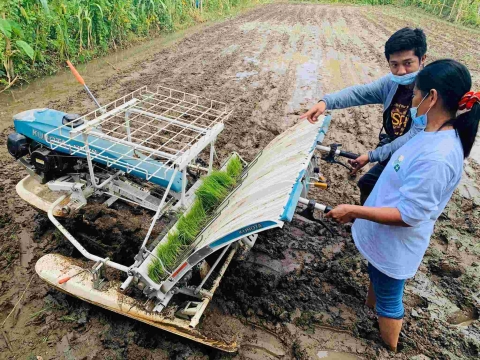Engr. Johnson Lameg shows the different parts of the walk-behind transplanter during one of the TOTs led by ATI in Region II. (photo by ATI-RTC II)
As the training arm of the Department of Agriculture (DA), the Agricultural Training Institute-Regional Training Centers (ATI-RTCs), in coordination with partner agencies, continue to rollout activities while observing safety measures amid the COVID-19 pandemic.
“We are happy to announce that the RCEF program components remain in full swing, despite the restrictions brought about by the community quarantine. Now, more than ever, our farmers need RCEF and similar support to help them bounce back,” Agriculture Secretary Dar said.
ATI-RTCs nationwide are now using different strategies to conduct training and other related activities under RCEF, prioritizing the health and safety of the participants and trainers.
Recognizing the vital role of radio to RCEF’s target audience, school-on-the-air (SOA) programs were created as alternative to the face-to-face training mode of the Farmers’ Field School (FFS). These programs offer a learning package through a series of radio-based lessons on rice production and other related technologies.
“There will be modifications in learning approach and delivery to optimize learning under the new normal,” Rosana Mula, ATI Assistant Director and chairperson of the RCEF-Rice Extension Services Program technical working group, shared.
On June 23, ATI Ilocos launched its SOA program for rice farmers, while ATI Caraga aired its SOA on Inbred Rice Seeds Production and Farm Mechanization on July 9. Other ATI-RTCs nationwide are set to air their respective SOA programs in the coming months.
Meanwhile, the Training of Trainers (TOT) is also taking off as part of the rice extension services. This is conducted by ATI-RTCs, in partnership with other agencies, to fully develop trainers with knowledge and skills that they can apply for farmers’ training.
“We hope that through the TOT, we would be able to multiply our trainers to reach out to more of our rice farmers, towards Masaganang Ani at Mataas na Kita,” ATI Director Alfredo Aton said.
Simultaneously, information caravans and technical briefings have shifted from mass gatherings last year to radio broadcast and use of social media platforms like Facebook this year. Through these radio and online programs, the RTCs discuss RCEF-related updates and information.
Likewise, ATI Bicol use their official YouTube channel for RCEF-related content which the viewers can also stream through their Facebook page and website. To date, ATI Bicol has launched three information caravans for RCEF beneficiaries.
Information, education, and communication materials on RCEF are also being disseminated during seed distribution. The ATI-RTCs also continue to develop information graphics, modules, and videos to promote the services under RCEF.
Through these initiatives, the DA aims to attain the availability of affordable, accessible, safe, and nutritious rice for Filipinos, as well as improve the quality of life of rice farmers and their households, even with the restrictions brought by the pandemic.

